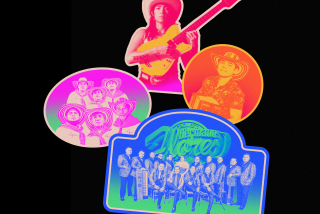Exploring Music From the Near East : Steven Loza Looks at 200 Years of Undocumented History in ‘Barrio Rhythm’
LOS ANGELES — It might seem strange to find an ethnomusicologist jamming in an East L.A. bar and grill far from the constraints of academia. But when the teacher on the stage is Steven Loza, it’s almost expected.
“I grew up in the Eastside of Los Angeles. I’ve played trumpet ever since grammar school,” said the UCLA assistant professor during a break between sets at T.Q.’s, where his jazz sextet performs on Wednesdays.
“Steve is an excellent musician. He continues the legacy of great Chicano musicians like Eddie Cano and Poncho Sanchez,” said T.Q.’s owner Rudy Lopez, who recently gave a publication party for the release of Loza’s new book, “Barrio Rhythm: Mexican American Music in Los Angeles.” Published by the University of Illinois Press as part of its “Music in American Life” series, the book explores 200 years of largely undocumented history of Latino music.
“Chicanos are hungry for anything that reflects their musical heritage. They’re buying a book that is an academic study,” said Loza, amazed that what started out as his dissertation is selling well off campus. “It also makes non-Latinos want to read about us.”
“Barrio Rhythm” uses interviews and early newspaper accounts to sketch portraits of seminal figures in Los Angeles music. These include composers and singers Pedro J. Gonzalez and Lalo Guerrero, 1940s pop crooner Andy Russell (“Besame Mucho”) and Chico Sesma, a big-band era musician and promoter of musica tropical.
Sketches of Chicano rocker Ritchie Valens, and groups such as Thee Midniters, the Salas Brothers and Cannibal and the Headhunters highlight the section on the ‘50s and ‘60s. The 1970s section runs the gamut from the nationalistic pride of El Chicano and Tierra to the angry punk sounds of the Brat and Los Illegals. Loza also illustrates how Latina singers Vikki Carr and Linda Ronstadt conquered mainstream pop and successfully moved into Spanish-language mariachi music. Loza ends his book with a case study on Los Lobos and the future of Mexican-American music.
Still, the 41-year-old author admits that “Barrio Rhythm” is merely the tip of the iceberg. “The subject is encyclopedic,” he said. “My book is just a beginning. Now that people know it can be done, I hope other music writers and critics will continue the momentum.”
Loza’s interest in writing the book came after he was in graduate school at UCLA, where he formed a mariachi touring group. His academic interests led him to research Afro-Cuban music for his master’s degree. It was then that he discovered little had been written or documented about Mexican-American music, especially the music from his East L.A. back yard. “I realized that Chicano music was a valid topic for a doctoral dissertation,” he said.
In his book, Loza points to the essential role of Mexican-American music in the cultural development of Los Angeles and its influence on mainstream popular culture. But he doesn’t see it as a new form of music.
“ Tejanos have their Tex-Mex music, but we don’t have an L.A.-Mex music. That’s the reason Los Lobos will do everything from jarochos from Veracruz to Tex-Mex and R&B;, but they don’t do L.A.-Mex. There’s no such thing. The ‘60s oldies groups represented a Chicano form of R&B.; You can hear Li’l Ray (Jimenez) or the Salas Brothers and think they’re black. Yet a Chicano can tell the difference.
“Los Angeles Mexican culture was scattered. It was cosmopolitan, too. Mexicans spent their time adapting to different things. There was no social context where a certain style of music could come out.
“Instead, L.A. Mexicans were fed Anglo and Hollywood values. There were also other musical influences. The case studies used in the book allude to that. It was a heterogeneous situation as opposed to a homogeneous one that spawned Tejano music.”
Writer and poet Luis Rodriguez considers the East Los Angeles sound as both transformational and influential. “There’s a new book on the classic pop song ‘Louie, Louie,’ ” noted Rodriguez. “Richard Berry, the composer, admits he got the basic rhythm for the song while listening to a Mexican band on the Eastside, led by Rene Touzet.”
On stage, a young Chicano stand-up comic caught Loza’s attention. “Do you know that the No. 1 album in the U.S. is by a Los Angeles group?” the comic said. “Cypress Hill includes Chicano, Cubano and Puerto Rican musicians.”
At the back of the club, Loza applauded the news. “I like Chicano rappers like Kid Frost and a Lighter Shade of Brown,” he said, offering a brief assessment of other musical trends. “During the (Chicano Studies hunger) strike at UCLA, some Mexican bilingual rappers impressed me. So does the whole phenomenon of Banda music. Imagine a Mexican music that became popular here first and only later in Mexico! The collective expression in the clothing the bands and audiences wear, the dance-- la quebradita --something mariachi music doesn’t lend itself to. In addition, a station that plays Banda music (has been) No. 1 in Los Angeles radio, the largest market in the country.”
Loza also finds rock en espanol promising. “It’s good to know that Cafe Tacuba and other Mexican groups are creating their own unique brand of rock. That is the way of the future.”
Loza’s plans include the release of a CD of his earlier musical compositions and another of his jazz sextet. This will be followed by a year of researching and writing a biography on Latino music pioneer Tito Puente. As Loza prepared for his second set of the evening, it was evident which role gives him more satisfaction.
“I’m a musician first and foremost,” Loza said. “Many academics run away from that label. They prefer being known as musicologists. I find that attitude elitist.”
More to Read
Sign up for our Book Club newsletter
Get the latest news, events and more from the Los Angeles Times Book Club, and help us get L.A. reading and talking.
You may occasionally receive promotional content from the Los Angeles Times.








